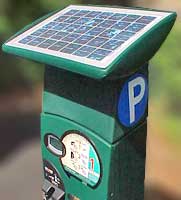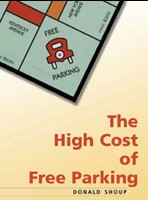The high cost (lost income) of "free" parking to the District of Columbia
 Two of these contraptions and some painted lines, and the DC Department of Public Works could stop a bit of "free riding" on the 1000 and 1100 blocks of 2nd Street NE.
Two of these contraptions and some painted lines, and the DC Department of Public Works could stop a bit of "free riding" on the 1000 and 1100 blocks of 2nd Street NE.Last week, I wrote about cars parking for free on the east side of the 1000 and 1100 blocks of 2nd Street NE. ("Free parking, especially by non-DC residents, is a waste of precious public assets")
I had occasion to "census" these blocks again this morning, at about 8:20 a.m.
1000 block of 2nd Street NE
DC - 6 cars
MD - 9 cars
VA - 1 car
(on the west side of the street, where there are 4 hour parking meters, there were 2 cars with DC plates and 1 from MD)
1100 block of 2nd Street/Delaware Avenue NE
DC - 7 cars
MD - 17 cars
VA - 4 cars
NC - 1 car
The meters on the west side of the 1000 block charge 25 cents for 30 minutes/50 cents/hour. For a 9 hour day, this is $4.50 in lost income per spot. Granted some of the spots used currently wouldn't be legal anyway. Still, the lost income for a 50 week year is $45,000.
To make it a bit more convenient, let the meters be for a 9 hour day. Maybe charge an extra 10 cents (I don't know, maybe more, have to check out Shoup) an hour for the privilege.
While meter usage on the 1000 block will be temporary (because of impending construction), this will set the opportunity cost structure for which Cohen Companies will have to reimburse the city for lost income.
Now Professor Shoup argues, in The High Cost of Free Parking, and elsewhere, that communities should get parking revenue back, as a way to pay for public space improvements and maintenance.

Even after taking 20% off the top for administration, here is the potential of $36,000 that could be spent to provide extra lighting under the bridges between the east and west side of the railyard, along 2nd Street, etc.
(Speaking of wasted opportunities for developer proffers-community amenities, the Cohen Companies, developers of Square 749, should have had to pay for an upgrade to create adequate "sidewalk" -- as opposed to what I call "street" -- lighting on all four sides of the square -- 1000 block of 3rd, 1000 block of 2nd, 200 block of K, 200 block of L.)
Instead, drivers are using the public space for free.
Today's Examiner has a letter, purportedly from a DC resident, stating that commuters already pay for the costs they impose on the District -- ignoring the fact that roads are subsidized at a rate of 50% of their cost--furthermore many of the road users in DC hail from Maryland and Virginia, and that the subway and bus system is heavily subsidized by DC at a greater rate per capita compared to the Maryland and Virginia members of the WMATA compact, because of how the funding formulas are calculated. Here's the letter:
Commuters already pay for city services
RE: “High court backs commuter tax ban,” May 16. I am so happy that the Supreme Court backed the commuter tax ban. How can Mayor Anthony Williams say that commuters work in the District but do not pay for the city services they use?
We are not coming into the District and using free services. We have to buy gas and pay for maintenance on our cars to drive here, or buy bus, Metro or train tickets to get to work. We have to pay for parking and for the food that we eat.
If I had to pay a commuter tax to work in the District, I would get a job in a fast-food restaurant close to my home before I would drive or use public transportation to come to work here.
Rosalie Goosby, Washington
Note to Ms. Goosby: "We have to buy gas and pay for maintenance on our cars to drive here"--isn't what DC residents are talking about in terms of subsidizing the 70% of the people who work in the District but don't live here. You use the roads, which we pay for. You use the subway system, which we pay for disproportionately. We maintain sidewalks, public spaces, provide emergency services, etc., that you use.
So many of you work for organizations that are non-profits, and the city doesn't generate income taxes from the businesses, and the retail transactions conducted by this organizations don't generate sales taxes either.
Because of the same restrictions on taxing non-residents, we can't tax professional athletes for the money they earn in the city, unlike virtually every other jurisdiction in the U.S. And recently it was held that for a particular kind of corporation, where the earnings are distributed to the individual owners and then taxed, that DC cannot tax the earnings of the nonresident owners of the business, even though these are businesses based in the District of Columbia that should be able to be taxed in the same manner as any other business based in the city.
And at the same time, your jurisdictions, particularly Arlington, Alexandria, and Montgomery County, provide incentives for businesses to leave our city, further reducing the corporate income and property taxes paid to the District.
The high cost of free parking adds up...
Index Keywords: parking; public-assets



0 Comments:
Post a Comment
<< Home